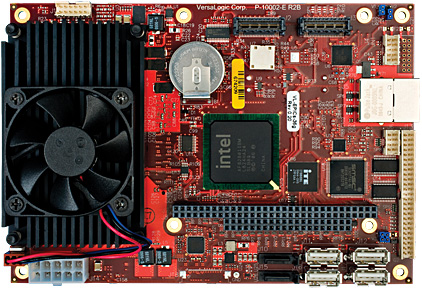EPIC SBC has SUMIT and MiniBlade interfaces
Sep 29, 2009 — by LinuxDevices Staff — from the LinuxDevices Archive — 2 viewsVersaLogic has announced an EPIC-format SBC (single board computer) that includes SUMIT (Stackable Unified Modular Interconnect Technology) and PC/104 connectors. The “Komodo” supports the 2.27GHz Core 2 Duo P8400 processor, offers up to 4GB of DDR3 memory, and has a MiniBlade socket for adding flash memory, the company says.
Like several other recent SBCs, the VersaLogic Komodo supports several new standards from the Small Form Factor Special Interest Group (SFF-SIG). One of these standards is the group's SUMIT specification, launched in April 2008. Billed as an improvement on PC/104, SUMIT includes two small surface-mount connectors (SUMIT-A and SUMIT-B) that are usable singly or together.
SUMIT connectors support both legacy low-speed peripherals and modern high-speed interfaces like USB and x4 PCIe, and were designed for a variety of form factors, the SFF-SIG says. Recent devices using SUMIT have included the likes of the WinSystems EBC-Z5xx-G, EBX-format baseboards that employ COMIT processor modules, and the Adlink CoreModule 730. (The latter is a "SUMIT-ISM" board, employing the same 3.8 x 3.6-inch dimensions as PC/104 boards, but replacing the old 120-pin PCI-104 connector with the 104-pin SUMIT A/B pair of connectors.)
The second new SFF-SIG specification used by VersaLogic's Komodo is MiniBlade. Jointly developed by SiliconSystems and Samtec, MiniBlade defines a flexible pinout for USB, SATA, and PCI Express deices, plus a latch that helps connected devices withstand shock and vibration better than if they were interfaced via consumer-class dongles, says the SFF-SIG.

VersaLogic's Komodo
Readily visible on top of the 6.5 x 4.5-inch Komodo, as depicted above, are the device's SUMIT-A and SUMIT-B connectors, which are said to provide three x1 PCI Express lanes, LPC, SPI, and four USB 2.0 ports. Also visible is the Komodo's PC/104 connector, retained to provide ISA bus compatibility.
On the bottom of the board (not pictured) are its MiniBlade connector, plus a SODIMM slot that can accept up to 4GB of DDR3 memory, according to VersaLogic. Like VersaLogic's own SUMIT-ISM board, the recently announced Ocelot, the Komodo is also said to include a connector for SPX (serial peripheral expansion) expansion modules.
According to VersaLogic, the Komodo is designed to use Intel's 45nm Core 2 Duo P8400, which is clocked at 2.27GHz and has a 25-Watt TDP. If extended temperature (-40 to 185 deg. F) is desired, customers can specify a 1.6GHz Core 2 Duo CPU instead, the company adds. Either way, it's said, the device uses Intel's GM45 northbridge and ICH9M southbridge.
VersaLogic says the Komodo's "real world" ports include an RJ45 port for Gigabit Ethernet, four USB 2.0 ports, and an SATA port. Meanwhile, four serial ports, VGA, LVDS, HD audio, and PS/2 interfaces are all served up via pin headers, for which the company offers optional cable kits.
Features and specifications listed by VersaLogic for the Komodo include the following:
- Processor — Intel Core 2 Duo clocked at 2.27GHz or 1.6GHz
- Chipset — GM45 northbridge and ICH9M southbridge
- Memory — Up to 4GB of DDR3 RAM via single SODIMM slot
- Networking — Gigabit Ethernet port with RJ45 connector
- Other I/O:
- 4 x USB 2.0/1.1 ports (SUMIT can add 4 additional with appropriate adapter)
- 1 x SATA
- 4 x serial (1 x RS232 and 3 x RS232/422/485, via headers)
- Audio (via header)
- 2 x PS/2 (via header)
- 1 x VGA (header)
- 1 x LVDS (via header)
- Expansion:
- SUMIT-A and SUMIT-B
- PC/104
- MiniBlade
- SPX
- Operating temperature:
- Standard — 32 to 140 deg. F (0 to 60 deg. C)
- Extended — -40 to 185 deg. F (-40 to 85 deg. C)
- Dimensions — 6.5 x 4.5 inches (165 x 115mm)
Availability
According to VersaLogic, the Komodo is compatible with Linux, Windows Embedded, VXWorks, and QNX operating systems. The board, whose pricing was not cited, will start shipping in October, the company says.
More information may be found on the VersaLogic website, here.
This article was originally published on LinuxDevices.com and has been donated to the open source community by QuinStreet Inc. Please visit LinuxToday.com for up-to-date news and articles about Linux and open source.